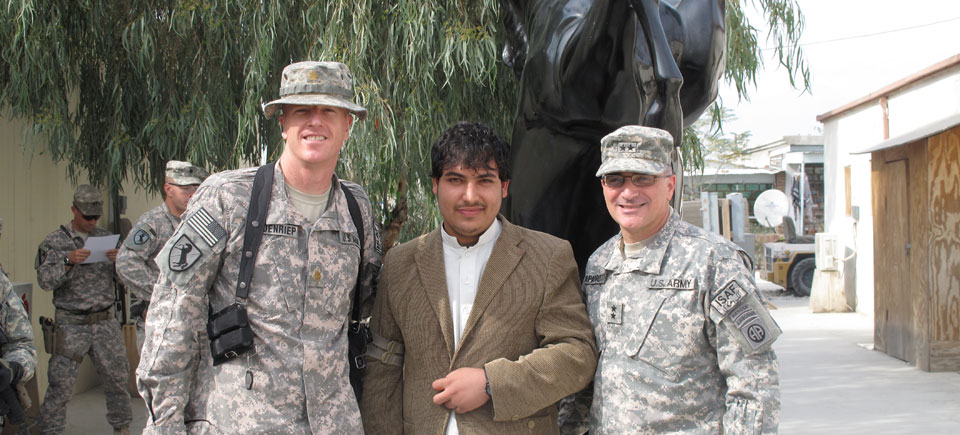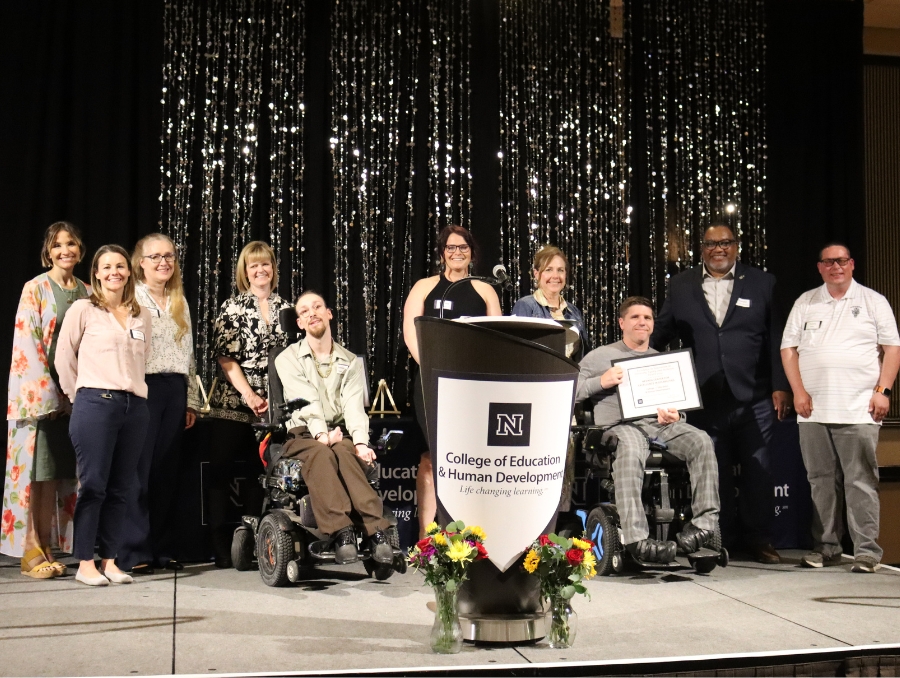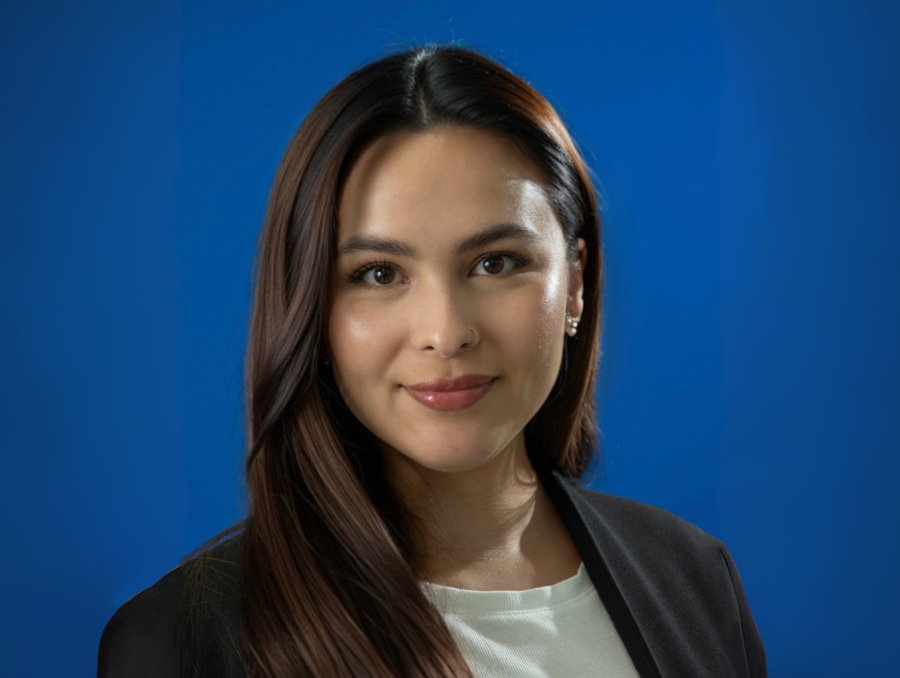They grew up worlds apart, one in the relative peace of Reno and the other in Afghanistan, where the people over the past 30-plus years have seen more war than peace.
Lt. Col. Kurt Neddenriep came to Afghanistan in military service in 2009-2010 as executive officer of the 1st Squadron, 221st Cavalry of the Nevada National Guard. He was part of the largest deployment of Nevada's soldiers since World War II. Although he was on a mission, with specific strategic goals, Neddenriep also knew he was an important point of contact for the people of Afghanistan.
"We would tell our guys, you're ambassadors," Neddenriep said. "Even if your job is to serve as a security force, if you act too harshly, you can do more harm than good. In my mind, the two have always been equally important. In a counterinsurgency war, you're as much a diplomat as you are a soldier."
Aimal Halim had lost his father when he was six months old. When the United States' war to rid Afghanistan of Taliban forces began in 2003, Halim was barely a teenager. Together, with his mother and sister, he had, through much toil, scraped out a life. With a wheelbarrow, he had hustled work on the streets of the Afghan capital of Kabul, asking anyone who would listen if they needed help with hauling ... hauling anything at all.
"We had a very rough life," Halim said. "We lived in a tent, under a bridge for a while. I had holes in my shoes. I wore sandals borrowed from one person, and a jacket borrowed from another person. You have to understand that my country has seen more than 30 years of war. You learn very quickly that as long as you have something to eat and a roof over your head, as long as you have your family, you're going to be OK."
Halim would watch as his mother would take the wool from sheep and knit for hours on end, selling the final product for a couple of eggs or a quart of milk. During one stretch of more than seven years, the family never had any meat.
Yet the family never gave up hope.
"My mother would always tell me, 'These days will change,'" Halim said. "She would say, 'If you find your way, if you keep working at things, things will change.'"
In his own way, Neddenriep had been raised with a similar emphasis on hard work, on the bedrock optimism that opportunity presented itself to those who were industrious and who had a strong sense of faith.
Neddenriep was an outstanding runner at Bishop Manogue Catholic High School in the late 1980s, forcing his tall and rangy frame that seemed better suited to a basketball court ahead of other smaller, bird-boned competitors. He pushed himself in the classroom, was an honor's student, and worked long hours at Long's Drugs on California Avenue in Reno.
He passed on a track and cross-country scholarship offer to the University of Idaho, ran for a time for the University of Nevada, Reno's men's cross country and track teams, and majored in business at the University. Even while immersed in studies, Neddenriep realized he needed more challenge. He joined the Department of Military Science's ROTC program, and later, upon graduation from the University in 1994, he joined the Nevada National Guard. As with his running, he learned all over again about his capacity to push himself, to demand more, to always seek a new finish line.
"My time with the ROTC program was very formative," Neddenriep remembered. "The discipline and the leadership classes really helped me succeed in other areas of my life. Going to UNR, and then getting into the Guard, were probably two of the best things that ever happened to me. The military combined with UNR was absolutely critical to who I am today."
Over time, Neddenriep came to understand that leadership was more than simply barking orders. As his tour of duty in Afghanistan illustrated, being a leader often entails the exact opposite of the staccato yell of the drill sergeant.
Sometimes, being a leader means opening a hand, and extending it to someone in need.
And that was exactly what happened when two paths crossed.
"I came away convinced," Neddenriep remembered, "that this really was a defining moment for both of us. I was determined that I was going to make it happen."
Halim, at the urging of his uncle and needing money, had volunteered to serve as a translator for the American forces of Operation Enduring Freedom in Afghanistan.
He had learned his English the old-fashioned way.
"I'd sit in a coffee shop with big screens and I picked up the language watching movies and shows," he said. "I couldn't afford books. I was determined to learn it and I would watch Tom Cruise or George W. Bush speaking."
He learned quickly what was at stake.
"I had no idea what body armor was for, what combat was like," he said. "My first night, we were attacked. There was this constant pop-pop-pop overhead. The Taliban attacked twice that night. I was on the ground, it was three o'clock in the morning, and that was my wake-up call. Welcome to the Army job."
He earned a reputation for being efficient, loyal and, when the time was right, humorous.
On a mission in a valley surrounded by snowcapped peaks, where the creeks were rushing and the villages were isolated and seemed straight out of medieval times, Halim saw another unit. There was a tall, pale-complexioned officer whose voice seemed to soar. The officer was surrounded by children. They hugged his legs, spinning around him like water sprites.
"Hey American! Hey American!" the children screeched with delight.
The grin on the officer's face was something Halim would always remember. Beneath the helmet and the body armor was an abiding concern for others.
"Here was this officer, and he was high-fiving the kids and he was practicing his Pashto language," Halim said of the first time he ever saw Kurt Neddenriep. "His humbleness seemed so great to me. I went to him and asked him, 'Hey sir, do you need my help?' He smiled and said, 'Sure.'
"I didn't know he was the deputy commander of the entire unit. You would've never known that. He was so down-to-earth and friendly. It was his first patrol and his sixth day in Afghanistan."
Later that day, the two shared a seat after the truck Halim had been traveling in had broken down. It was getting dark. It was a time when the Taliban would sometimes strike. Halim was understandably nervous. He had been feeling this way with greater frequency for some reason. Neddenriep calmed the young man by talking about his own life back in America.
"He said he had a wife, her name is Katie, and that he had a dog named Duke, and I chuckled," Halim said. "As he talked about it, I realized that we're all the same people. We have the same beliefs, we care about our mothers, our sisters, our wives ... and our families.
"And then we went our own ways."
Two weeks passed.
Homesick after months of translating and the uncertainty of not knowing when the next engagement in battle would be, Halim decided it was time to quit his post and return home. He was making $480 per month - a huge sum by Afghan standards - but, as he remembered, "It wasn't the money. I just came to the conclusion I couldn't do this anymore. I went to my mentor in the company and told him, 'I can't do it.' So I resigned."
It was a hot and dry day. As Halim waited for a ride off the base, he asked if he could visit a nearby dining hall for a Gatorade.
He grabbed a Gatorade, and then felt a pat on the shoulder.
"Hey Aimal," Neddenriep said, genuinely happy to see his young friend. "How are you doing?"
Something was wrong. Halim's face was clouded with uncertainty.
"He could see I was freaking out," Halim remembered. "When I told him I was leaving, he said, 'No way. How could we lose you? Why?'"
Halim explained his situation. By chance, Halim's former superior officer saw Halim talking to Neddenriep. The officer later went to Neddenriep, told him all about the good work Halim had been doing, and recommended that Neddenriep hire Halim. Halim was soon added to Neddenriep's company, and was given more time off to visit his family each month.
Halim's pride in working with the Nevadans on active duty began to swell.
"I would tell all the people I would come into contact with that the people who are fighting on the ground are very important," he said. "The Nevada National Guard was the best unit in Afghanistan. The Nevada National Guard was the most professional unit in my whole career in working with Americans. Both the officers and the soldier were aware of the history and culture of Afghanistan, and that's why they did a great job."
Neddenriep was just as impressed with the work of Halim.
"In any language, Aimal just has this really great ability to communicate, to connect with people," Neddenriep said. "He's a genuinely good person, with a great sense of humor."
After about a month of working with the troops from Nevada, Neddenriep began to dig a little deeper into his friend's motivation. He wanted to know what Halim hoped to accomplish as he grew older.
"One day, Kurt said, 'Aimal, what's your big dream?'" Halim said. Halim thought for a moment. He had graduated with honors from high school in 2007, but could not go to college because of financial considerations. "And I said, without even hesitating ... 'Higher education. I would love to go to college.'"
"Wow," Neddenriep responded. "I'm thinking the same thing."
Neddenriep had a simple proposal. Neddenriep told Halim that if he could get a visa, and be accepted into the University of Nevada, Reno, and carry at least a "B" average each semester, "I'll pay for your four years of school, and take care of your mother while you're in Nevada studying.'"
Halim had only one reaction.
He began to cry.
"It was the happiest moment in my life," Halim said.
It wasn't an easy process, but when it was over, the gathering of transcripts, the paperwork, the initial uncertainty and stress of sitting through interviews in the United States embassy in Kabul, the waiting period of 120 days, where, in the end, only four Afghans - including a young man named Aimal Halim - would be granted visas to study in America, it had all been worth it.
On July 2, 2010, Halim bought a plane ticket America. As he purchased the ticket, it dawned on him that there hadn't been much more than a promise that had brought him to that moment. Just as Neddenriep thought he had seen something special in Halim, the young man, too, realized that he had seen something equally remarkable in the soft-spoken military man from Nevada who had village children hanging off his every high-five, filling the flock of youngsters with the possibility of a kinder, gentler and better life with every smile he flashed.
"It was just Kurt's word," Halim said. "Just his word that he wanted to help me. His word was his word. His word meant everything.
"What would have happened to me if I hadn't seen that officer surrounded by the children? What would have happened to me if the truck hadn't broken down in the same night and he hadn't offered to let me sit with him in his truck? What would have happened if I hadn't gone back for that Gatorade that day and I did not see Kurt in the last moment of my leaving?
"Everything has happened for a reason. A wonderful, unexplainable reason."
Neddenriep, too, was amazed at all that had transpired. It could have all played out so differently, in the blink of an eye, if not for a few moments where one person, far away from his own home in the middle of a war, decided to help another.
Neddenriep was quick to point out that there have been others, since Aimal's arrival in Reno, who have also contributed to the young man's education. Area service clubs, including the Reno Rotary Club and Soroptimist Club of Reno, have make key donations.
"We can't thank these groups, plus a number of unaffiliated individuals who have helped, enough," Neddenriep said. "The community has been phenomenal."
When Neddenriep and Halim have been asked to speak to local groups, Neddenriep often takes a step back and watches with a father's, or an older brother's, pride. He said he can see an already mature young man slowly transitioning into his next role in life - a role that Neddenriep is convinced will benefit Afghanistan and its future.
"It just makes you very humble, no matter how well trained you are, to know that you've made it through some of the randomness of a war," said Neddenriep, who noted that all the men under his command had returned to Nevada safely. "I think the No. 1 thing that I want is for Aimal to be happy, for his family to be safe, and for him to have a bright future. He would like to go back and serve his country and be involved with the government. What I would love is to see Afghanistan be stable and safe and he would be one of the young, educated leaders who help move that country forward. I know that's a big thing to him."
"That is my hope and my dream," Halim added. "To return to my country. My hope is to be an honest person who serves my country in a meaningful way ... politician, public servant, writer, poet, it doesn't matter. I've learned from Kurt that even if you have a chance to help one kid, that is one of the greatest achievements you can ever have.
"He's told me, 'You will never have to pay for anything as long as you study hard and get the most out of your education.' It's the greatest gift possible."
In two years at the University, Halim has been taking between 12 and 15 credits per semester, and has been on the dean's list in political science. He understands that Afghanistan remains a work in progress. Yet he has marveled at the progress his country has seen in less than a decade.
"We are stepping toward true democracy," Halim said. "We have paved roads now. We have nine million girls attending school. Thirty-one percent of our parliament are women. We have 50- and 60-year-old people attending English language courses at night. Look at all these developments.
"If there are enough young, educated people, whose beliefs are not at either extreme end of the spectrum, whose hands are not colored with the blood of innocent Afghan people and who are not corrupted, who don't have an old mentality and who understand what true democracy and freedom is, then I think you can fix a country."
"Just think about the difference 100,000 Aimals can make in that country," Neddenriep added. "More than 30 years ago, an entire educated class of people fled from the Soviets, and then the Taliban took control, so it's been a slow rebuilding process. Aimal is one brick in this wall that needs to be created for a modern Afghanistan.
"He's part of a generation in Afghanistan that wants what we want: stability, democracy and freedom. I really think he's going to be one of those special people who help break a cycle. He's a guy who's going to make a big difference in anything he chooses to do."
Two years ago last month, a young man traveled from one country to another, lured by the promise of a another man who simply gave his word that there a better life was within his grasp.
"Every day," Aimal Halim said, "I still can't believe I'm in America and I'm going to an American university. I am so thankful for my American family support and also so grateful for being in America. What a nice country. It amazes me every day when I see what people have here. It's been amazing ... very different to experience something that you've dreamed about all your life. I still don't believe it."











